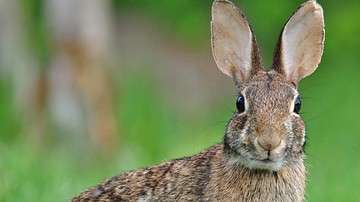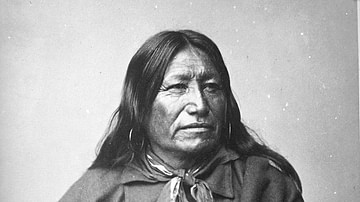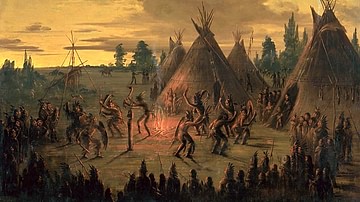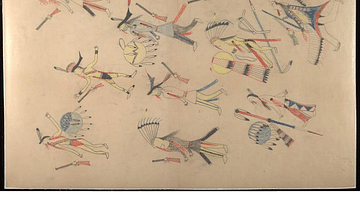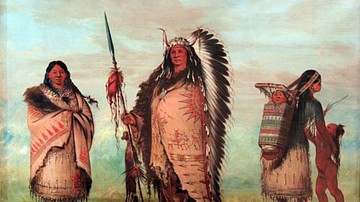How the Rabbit Lost His Tail is a Sioux legend, part origin myth and part didactic tale, explaining why the rabbit looks as it does, why the owl is a night bird, and how one should treat a member of one’s family and also one’s community, understood as an extended family.
The story deals with two brothers, the powerful older brother – a spirit-being whose name is translated as "genie" – and the rabbit, the younger brother. Once the rabbit has grown and believes himself an adult, he sets off to experience the world and gets himself into all kinds of trouble, always brought on by his own naivety and curiosity. No matter how annoying the rabbit is, or how many times he is warned against the kind of impulsive behavior that gets him into trouble, his older brother always comes to help him.
The older brother exemplifies the kind of patience and strength valued by the Sioux in the present day as much as when this story was composed centuries ago. One is supposed to help those who need help, no matter how many times they fall into difficulties and no matter how many times those troubles are caused by their own actions. In the Siouan culture – as in Native American culture generally – the good of the community outweighs the interests or needs of the individual. It does not matter, therefore, how many times a "rabbit" in the community gets itself into trouble; an "older brother" should always be willing to come, even from a thousand miles away, to help.
Text
The following text is taken from Myths and Legends of the Sioux (1916) by Marie L. McLaughlin, who was one-fourth Sioux and lived on the Sioux reservation where she recorded the stories, previously passed down through oral transmission, and preserved them in written form. It is not possible to date the original composition or how it may have changed from generation to generation in the telling but McLaughlin’s version is the earliest to appear in written form.

Although the mythological figure of the genie (jinn) is a well-known mythological figure of the Near East, Native American cultures developed their own version of this supernatural entity, which McLaughlin translates here as "genie", but which should not be understood as the better-known figure first popularized by Persian literature.
Once upon a time there were two brothers, one a great Genie and the other a rabbit. Like all genie, the older could change himself into any kind of an animal, bird, fish, cloud, thunder and lightning, or in fact anything that he desired.
The younger brother (the rabbit) was very mischievous and was continually getting into all kinds of trouble. His older brother was kept busy getting Rabbit out of all kinds of scrapes.
When Rabbit had attained his full growth, he wanted to travel around and see something of the world. When he told his brother what he intended to do, the brother said: "Now, Rabbit, you are Witkotko (mischievous, so be very careful, and keep out of trouble as much as possible. In case you get into any serious trouble, and can't get out by yourself, just call on me for assistance, and no matter where you are, I will come to you."
Rabbit started out and the first day he came to a very high house, outside of which stood a very high pine tree. So high was the tree that Rabbit could hardly see the top. Outside the door, on an enormous stool, sat a very large giant fast asleep. Rabbit (having his bow and arrows with him) strung up his bow, and, taking an arrow from his quiver, said:
"I want to see how big this man is, so I guess I will wake him up." So saying, he moved over to one side and took good aim, and shot the giant upon the nose. This stung like fire and awoke the giant, who jumped up, crying: "Who had the audacity to shoot me on the nose?"
"I did," said Rabbit.
The giant, hearing a voice, looked all around, but saw nothing, until he looked down at the corner of the house, and there sat a rabbit.
"I had hiccoughs this morning and thought that I was going to have a good big meal, and here is nothing but a toothful."
"I guess you won't make a toothful of me," said Rabbit, "I am as strong as you, though I am little."
"We will see," said the giant. He went into the house and came out, bringing a hammer that weighed many tons.
"Now, Mr. Rabbit, we will see who can throw this hammer over the top of that tree."
"Get something harder to do," said Rabbit.
"Well, we will try this first," said the giant. With that he grasped the hammer in both hands, swung it three times around his head and sent it spinning thru the air. Up, up, it went, skimming the top of the tree, and came down, shaking the ground and burying itself deep into the earth.
"Now," said the giant, "if you don't accomplish this same feat, I am going to swallow you at one mouthful."
Rabbit said, "I always sing to my brother before I attempt things like this."
So, he commenced singing and calling his brother. "Cinye! Cinye!" (brother, brother) he sang.
The giant grew nervous, and said: "Boy, why do you call your brother?"
Pointing to a small black cloud that was approaching very swiftly, Rabbit said: "That is my brother; he can destroy you, your house, and pine tree in one breath."
"Stop him and you can go free," said the giant.
Rabbit waved his paws and the cloud disappeared.
From this place, Rabbit continued on his trip towards the west. The next day, while passing thru a deep forest, he thought he heard someone moaning, as though in pain. He stopped and listened; soon the wind blew, and the moaning grew louder. Following the direction from whence came the sound, he soon discovered a man stripped of his clothing, and caught between two limbs of a tall elm tree. When the wind blew the limbs would rub together and squeeze the man, who would give forth the mournful groans.
"My, you have a fine place up there. Let us change. You can come down and I will take your place." (Now this man had been placed up there for punishment, by Rabbit's brother, and he could not get down unless someone came along and proposed to take his place on the tree).
"Very well," said the man. "Take off your clothes and come up. I will fasten you in the limbs and you can have all the fun you want."
Rabbit disrobed and climbed up. The man placed him between the limbs and slid down the tree. He hurriedly got into Rabbit's clothes, and just as he had completed his toilet, the wind blew very hard.
Rabbit was nearly crazy with pain and screamed and cried. Then he began to cry "Cinye, Cinye" (brother, brother).
"Call your brother as much as you like, he can never find me." So saying, the man disappeared in the forest.
Scarcely had he disappeared, when the brother arrived, and seeing Rabbit in the tree, said: "Which way did he go?"
Rabbit pointed the direction taken by the man. The brother flew over the top of the trees, soon found the man and brought him back, making him take his old place between the limbs, and causing a heavy wind to blow and continue all afternoon and night, for punishment to the man for having placed his brother up there.
After Rabbit got his clothes back on, his brother gave him a good scolding, and wound up by saying: "I want you to be more careful in the future. I have plenty of work to keep me as busy as I want to be, and I can't be stopping every little while to be making trips to get you out of some foolish scrape. It was only yesterday that I came five hundred miles to help you from the giant, and today I have had to come a thousand miles, so be more careful from this on."
Several days after this, the Rabbit was traveling along the banks of a small river, when he came to a small clearing in the woods, and in the center of the clearing stood a nice little log hut. Rabbit was wondering who could be living here when the door slowly opened and an old man appeared in the doorway, bearing a tripe water pail in his right hand. In his left hand he held a string which was fastened to the inside of the house. He kept hold of the string and came slowly down to the river. When he got to the water he stooped down and dipped the pail into it and returned to the house, still holding the string for guidance.
Soon he reappeared holding on to another string, and, following this one, went to a large pile of wood and returned to the house with it. Rabbit wanted to see if the old man would come out again, but he came out no more. Seeing smoke ascending from the mud chimney, he thought he would go over and see what the old man was doing. He knocked at the door, and a weak voice bade him enter. He noticed that the old man was cooking dinner.
"Hello Tunkasina (grandfather), you must have a nice time, living here alone. I see that you have everything handy. You can get wood and water, and that is all you have to do. How do you get your provisions?"
"The wolves bring my meat, the mice my rice and ground beans, and the birds bring me the cherry leaves for my tea. Yet it is a hard life, as I am all alone most of the time and have no one to talk to, and besides, I am blind."
"Say, grandfather," said Rabbit, "let us change places. I think I would like to live here."
"If we exchange clothes," said the other, "you will become old and blind, while I will assume your youth and good looks." (Now, this old man was placed here for punishment by Rabbit's brother. He had killed his wife, so the genie made him old and blind, and he would remain so until someone came who would exchange places with him).
"I don't care for youth and good looks," said Rabbit, "let us make the change."
They changed clothes, and Rabbit became old and blind, whilst the old man became young and handsome.
"Well, I must go," said the man. He went out and, cutting the strings close to the door, ran off laughing. "You will get enough of your living alone, you crazy boy," and saying this he ran into the woods.
Rabbit thought he would like to get some fresh water and try the string paths so that he would get accustomed to it. He bumped around the room and finally found the tripe water bucket. He took hold of the string and started out. When he had gotten a short distance from the door he came to the end of the string so suddenly, that he lost the end which he had in his hand, and he wandered about, bumping against the trees, and tangling himself up in plum bushes and thorns, scratching his face and hands so badly that the blood ran from them.
Then it was that he commenced again to cry, "Cinye! Cinye!" (brother, brother). Soon his brother arrived and asked which way the old man had gone.
"I don't know," said Rabbit, "I couldn't see which path he took, as I was blind."
The genie called the birds, and they came flying from every direction. As fast as they arrived the brother asked them if they had seen the man whom he had placed here for punishment, but none had seen him.
The owl came last, and when asked if he had seen the man, he said "hoo-hoo."
"The man who lived here," said the brother.
"Last night I was hunting mice in the woods south of here and I saw a man sleeping beneath a plum tree. I thought it was your brother, Rabbit, so I didn't awaken him," said the owl.
"Good for you, owl," said the brother, "for this good news, you shall hereafter roam around only at night, and I will fix your eyes, so the darker the night the better you will be able to see. You will always have the fine cool nights to hunt your food. You other birds can hunt your food during the hot daylight." (Since then, the owl has been the night bird).
The brother flew to the woods and brought the man back and cut the strings short and said to him: "Now you can get a taste of what you gave my brother."
To Rabbit he said: "I ought not to have helped you this time. Anyone who is so crazy as to change places with a blind man should be left without help, so be careful, as I am getting tired of your foolishness, and will not help you again if you do anything as foolish as you did this time."
Rabbit started to return to his home. When he had nearly completed his journey, he came to a little creek and, being thirsty, took a good long drink. While he was drinking, he heard a noise as though a wolf or cat was scratching the earth. Looking up to a hill which overhung the creek, he saw four wolves, with their tails intertwined, pulling with all their might. As Rabbit came up to them one pulled loose, and Rabbit saw that his tail was broken.
"Let me pull tails with you. My tail is long and strong," said Rabbit, and the wolves assenting, Rabbit interlocked his long tail with those of the three wolves and commenced pulling and the wolves pulled so hard that they pulled Rabbit's tail off at the second joint. The wolves disappeared.
"Cinye! Cinye! (Brother, brother.) I have lost my tail," cried Rabbit. The genie came and seeing his brother Rabbit's tail missing, said: "You look better without a tail anyway."
From that time on rabbits have had no tails.

